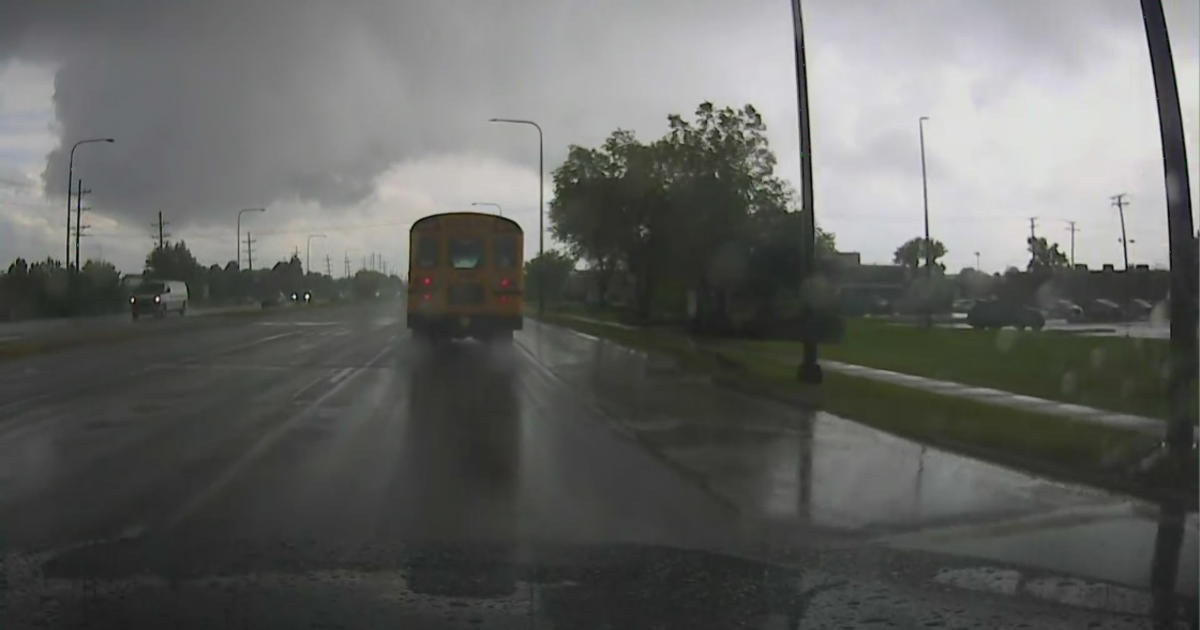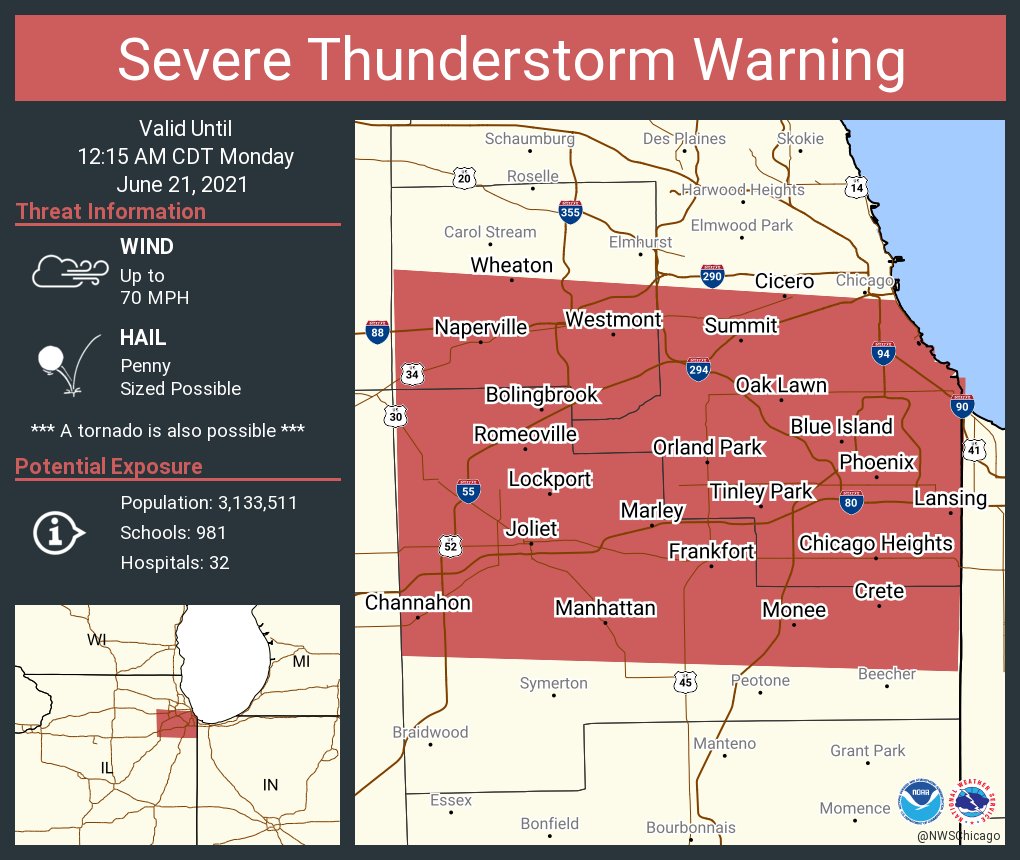Listen up, folks. If you're living in or around Chicago, or maybe just visiting this beautiful Windy City, understanding the ins and outs of tornado warning chicago is crucial. We're not just talking about some random weather event here; we're talking about Mother Nature at her most intense. Tornado warnings aren't something you want to ignore, and trust me, you don’t wanna be caught off guard when the skies turn dark and the winds start howling. So let's dive in and break it down for ya.
Tornadoes can strike with little to no warning, and when you hear that siren blaring or get an alert on your phone saying "tornado warning chicago," it means business. This isn't the time to go outside and check it out or grab your camera for a quick selfie. No, no, no. It's time to act fast, stay safe, and protect yourself and your loved ones. We'll cover everything you need to know, from what a tornado warning actually means to how you can prepare for the worst.
So, buckle up, because we’re about to take you through the nitty-gritty of tornado warnings in Chicago. This city is no stranger to extreme weather, but that doesn’t mean you should take it lightly. Let’s make sure you’re ready for whatever comes your way.
Read also:Tekken 8 Rank Distribution January 2025 A Deep Dive Into The Fighting Game Scene
What Exactly is a Tornado Warning?
Alright, let’s start with the basics. A tornado warning is NOT the same as a tornado watch, okay? A tornado watch means conditions are ripe for a tornado to form, but it’s not happening just yet. A tornado warning, on the other hand, means a tornado has been spotted or indicated by radar. That’s when the alarms start going off, and you better believe it’s time to get to safety.
When you hear "tornado warning chicago," it means a twister could be heading your way. This isn’t a drill; it’s real life, and it’s happening right now. Tornado warnings are issued by the National Weather Service (NWS), and they’re based on radar data, eyewitness reports, and other meteorological information. So if you get that alert, don’t question it—just act.
Why Tornado Warnings Matter in Chicago
Chicago isn’t exactly tornado alley, but that doesn’t mean it’s immune to these powerful storms. The Midwest is no stranger to severe weather, and tornadoes can and do happen here. In fact, Cook County, where Chicago is located, has seen its fair share of twisters over the years. So, yeah, tornado warnings matter—a lot.
Think about it: you’re in the middle of a busy city with skyscrapers, traffic, and millions of people. If a tornado hits, it’s gonna be chaotic. That’s why being prepared and knowing what to do during a tornado warning is essential. You don’t want to be stuck in a traffic jam or wandering around downtown when the storm hits.
How to Stay Safe During a Tornado Warning Chicago
So, what do you do when you hear that ominous siren or see the alert on your phone? First things first: stay calm. Panic won’t help anyone. Here’s a quick rundown of what you need to do:
- Get indoors immediately. If you’re outside, find the nearest sturdy building.
- Avoid windows and exterior walls. These are the first things to go in a tornado.
- If you’re in a house or apartment, head to the basement or an interior room on the lowest level.
- Protect yourself with blankets, pillows, or even a mattress if possible.
- If you’re in a car, don’t try to outrun the tornado. Seek shelter in a nearby building or lie flat in a ditch.
Remember, tornadoes can strike quickly, so you don’t have time to waste. Every second counts, and the faster you act, the better your chances of staying safe.
Read also:Unveiling The Rise Of Amber Hageman A Modernday Inspiration
Creating a Tornado Safety Plan
Preparation is key when it comes to surviving a tornado. You don’t want to be scrambling for supplies or trying to figure out what to do in the heat of the moment. Here’s how you can create a tornado safety plan:
- Identify safe areas in your home or workplace. These should be basements or interior rooms with no windows.
- Put together an emergency kit with essentials like water, food, flashlights, batteries, and first aid supplies.
- Make sure everyone in your household knows the plan and practices it regularly.
- Stay informed by signing up for weather alerts and keeping a battery-powered radio handy.
By having a plan in place, you’ll be ready to act quickly and efficiently when a tornado warning is issued. Trust me, you’ll be glad you did.
Understanding the Science Behind Tornadoes
Now, let’s talk science for a minute. Tornadoes are nature’s most violent storms, and they form when warm, moist air collides with cold, dry air. This creates instability in the atmosphere, and if conditions are just right, a tornado can spin up in no time. But what makes tornadoes in Chicago different from those in, say, Oklahoma?
Well, for one, Chicago’s location near Lake Michigan can influence the weather patterns. The lake can moderate temperatures and affect the moisture content in the air, which can either fuel or suppress tornado formation. Plus, the urban landscape of the city can impact how tornadoes behave once they touch down. Buildings and other structures can disrupt the airflow, potentially weakening the storm or even enhancing its destructive power.
Common Misconceptions About Tornadoes
There are a lot of myths out there about tornadoes, and it’s important to separate fact from fiction. For example, some people think that tornadoes can’t happen in big cities or near large bodies of water. Wrong. Tornadoes can and do occur in urban areas, and they can cross rivers and lakes just fine. Another myth is that opening windows during a tornado will equalize the pressure and prevent your house from exploding. Again, wrong. That’s just gonna waste valuable time you could be spending getting to safety.
So don’t fall for these misconceptions. Stick to the facts, and make sure you’re prepared for whatever Mother Nature throws your way.
Chicago’s Tornado History
Chicago has seen its fair share of tornadoes over the years. Some of them have been relatively minor, while others have been absolutely devastating. Let’s take a look at a few notable tornado events in the city’s history:
- April 21, 1967: One of the worst tornado outbreaks in Illinois history hit the Chicago area, causing widespread damage and loss of life.
- July 13, 1996: A tornado touched down in the western suburbs, causing significant damage to homes and businesses.
- September 29, 2020: A rare EF-1 tornado struck downtown Chicago, shocking residents and making national headlines.
These events serve as a reminder that tornadoes can and do happen in Chicago, and it’s important to be prepared.
Lessons Learned from Past Tornadoes
Each tornado that hits the city teaches us something new. We learn about the strengths and weaknesses of our infrastructure, the effectiveness of our warning systems, and the resilience of our communities. For example, after the 1967 outbreak, improvements were made to the weather warning systems, and public awareness campaigns were launched to educate residents about tornado safety.
Similarly, the 2020 downtown tornado highlighted the importance of having a robust emergency response plan in place. It also showed us that even in a bustling city like Chicago, nature can still surprise us.
How Technology is Improving Tornado Warnings
Technology has come a long way when it comes to predicting and warning about tornadoes. Gone are the days of relying solely on sirens and radio announcements. Today, we have advanced radar systems, weather satellites, and mobile apps that can alert us to severe weather in real-time.
For example, the National Weather Service uses Doppler radar to detect tornadoes and issue warnings faster than ever before. Plus, apps like NOAA Weather Radio and FEMA can send notifications directly to your phone, giving you critical minutes to prepare.
Staying Informed with Weather Alerts
One of the best things you can do to stay safe during a tornado warning is to stay informed. Sign up for weather alerts through your local news station or a reliable app. Make sure your phone is set to receive emergency notifications, and consider investing in a weather radio for backup.
Remember, knowledge is power, and the more information you have, the better prepared you’ll be.
The Role of Community in Tornado Preparedness
Tornado preparedness isn’t just about individuals; it’s also about communities. Working together can make a huge difference in keeping everyone safe. Local governments, schools, businesses, and neighborhood groups can all play a role in tornado preparedness.
For example, many schools in Chicago conduct regular tornado drills to ensure students and staff know what to do in an emergency. Businesses can develop emergency plans and provide safe spaces for employees. And neighborhoods can organize meetings to discuss preparedness strategies and share resources.
Getting Involved in Your Community
If you’re looking to get more involved in tornado preparedness in your community, there are plenty of ways to do it. Volunteer with local emergency management agencies, participate in community events, or even start your own preparedness group. The more people who are informed and prepared, the safer the entire community will be.
Final Thoughts: Be Prepared, Stay Safe
Alright, folks, that’s the scoop on tornado warning chicago. Remember, these storms can strike without much warning, so it’s crucial to be prepared. Know the difference between a tornado watch and a tornado warning, create a safety plan, and stay informed through weather alerts and reliable sources.
And most importantly, act fast when a tornado warning is issued. Every second counts, and your actions could mean the difference between life and death. So, stay safe, stay smart, and let’s all do our part to protect ourselves and our communities.
Got any questions or tips of your own? Drop them in the comments below, and don’t forget to share this article with your friends and family. Together, we can make sure everyone in Chicago is ready for whatever Mother Nature throws our way.
Table of Contents
- What Exactly is a Tornado Warning?
- Why Tornado Warnings Matter in Chicago
- How to Stay Safe During a Tornado Warning Chicago
- Understanding the Science Behind Tornadoes
- Common Misconceptions About Tornadoes
- Chicago’s Tornado History
- How Technology is Improving Tornado Warnings
- The Role of Community in Tornado Preparedness
- Final Thoughts: Be Prepared, Stay Safe


